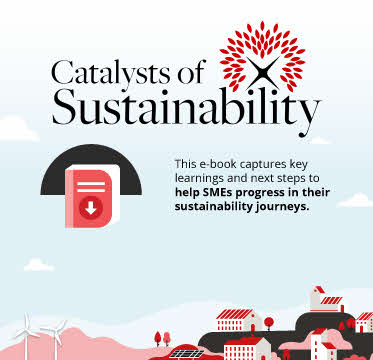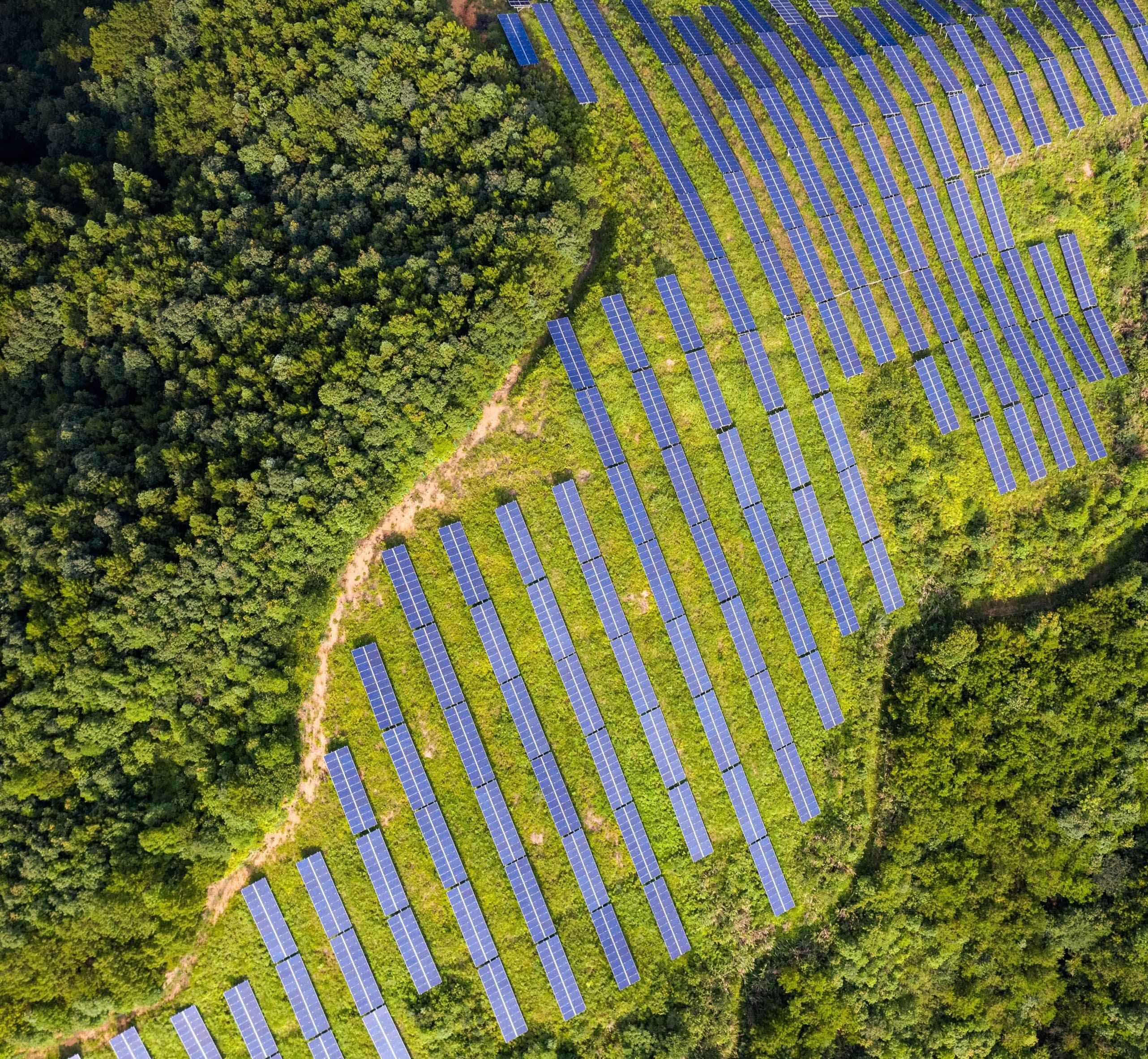Equipping SMEs for a sustainable future

As the backbone of our economy, small and medium-sized enterprises (SMEs) have a vital role in shaping the future of our planet. To spark SMEs’ journey as changemakers, DBS recently organised Disrupt: The Future of Sustainability– an event which brought together over 350 SMEs, social enterprises, partners and industry leaders in the sustainability space.
Sustainability has rapidly become a driving force in the global economy, and SMEs face rising pressure to adopt sustainable strategies. 140 nations globally – including Singapore – have announced or proposed net-zero targets, accounting for 90% of the world’s carbon emissions.
On the corporate front, more companies in Asia are setting ambitious decarbonisation goals. The rate of corporate commitments to the Science Based Targets initiative has doubled on average since 2019. Decarbonisation is top-of-mind for the finance industry as well. Investors, banks, and insurers worldwide have pledged USD 130 trillion to hit net-zero targets in their lending and financing.
“All these impact SMEs. If companies in your supply chain have decarbonisation targets, or if you’re looking for financing, you’ll get a lot of questions about your business model and sustainability strategy,” shared Helge Muenkel, Group Chief Sustainability Officer, DBS Bank.
In his keynote “The Future of Sustainability”, he emphasised the urgency of taking action now. “We don’t talk about why sustainability matters anymore – what’s really critical is the how. How can we implement this?”
To help SMEs embark on the how of sustainability, DBS speakers and other panelists shared their learnings on seizing sustainability opportunities and overcoming challenges. Here’s a recap of their key insights.
Finding the right balance of sustainability and profitability is key
For resource-lean SMEs, it’s understandable that financial returns come first. To progress on sustainability, it will be crucial to find the right balance between social impact and your bottom line.
“You need to run a viable business,” stressed Muenkel. “We know how important it is to generate financial returns, and at DBS, we strive to accomplish a balance between profit and positive impact on environmental and social matters.”
Sustainability and profitability aren’t necessarily at odds – having an ESG strategy can open better access to financing for your business. For example, DBS’ sustainability-linked loans enable businesses to pay variable interest by achieving certain ESG performance targets. To date, DBS has already committed SGD 61 billion in sustainable financing.
SMEs can also leverage DBS Foundation’s Business for Impact Grant Award. Since 2014, the DBS Foundation has awarded over SGD 13 million in grant funding to social enterprises. Last year, the Foundation launched a new grant designed to support SMEs looking to kickstart their sustainability journey.
“We’ve been on a journey to empower businesses-for-impact for the last nine years, and we’re committed to intensifying this journey,” said Karen Ngui, Head of Group Strategic Marketing and Communications, DBS Bank. “We firmly believe that banking enables lives and livelihoods.”
Sustainability can unlock new business opportunities
Beyond SME financing, sustainability can open up a world of business opportunities. Rather than seeing it as a restriction on business activities, it’s time for a mindset shift – sustainability can fuel innovation and help you create new business models.
During a panel discussion on “Building businesses of impact for the future”, three awardees of the DBS Foundation Grant shared the daring ideas that have propelled them to success.
1) UKL
Pineapple and fabric may not necessarily be used together but Gary Hsieh – Executive Vice President of Taiwan-based textile manufacturer UKL – has brought the two together to create sustainable clothing. By turning pineapple leaves from Taiwan’s many pineapple farms into high-performance fibres, UKL is creating an alternative to polluting fabrics like cotton.
2) Breer HK
As a university student in Hong Kong, Anushka Purohit noticed the sheer amount of leftover bread thrown out by bakeries – up to 1,692 tonnes daily. Today, she is the CEO and co-founder of Breer HK – a food upcycling startup that transforms bread waste into delicious local craft beer.
3) Brewerkz
A fellow craft beer brand, Brewerkz is a well-known name to Singapore’s beer connoisseurs. In 2020, they dipped their toes into the world of sustainable brewing when they launched Singapore’s first carbon-neutral beers in collaboration with Sentosa. Last year, they joined forces with PUB to create NEWBrew – a tropical blonde ale made with 100% NEWater.
Collaboration: the secret to overcoming challenges at every stage
Throughout the panel discussions and speeches, one theme emerged over and over: the power of collaboration. From innovation to ESG reporting, reaching out to the right partners can smoothen your otherwise gruelling journey to sustainability.
In the “Catalysts of Sustainability” panel discussion, the panellists agreed that SMEs require strong support to address complex sustainability challenges, against the increasing pressure they face to “green” their supply chain ecosystem. Our clients, SC Auto Industries and Agrocorp were on the panel to share their journey towards sustainability.
While investing in skills upgrading is not a natural priority for SMEs, upskilling has become a critical priority given the increasing ESG demands from stakeholders and the rapidly evolving geopolitical environment that SMEs need to navigate with care.
DBS’s support for SMEs goes beyond financial support by adopting a 360° approach to helping SMEs along in their respective transformation journeys:
- Education – Educate SMEs on sustainability through various channels
- Connection – Connect SMEs with key stakeholders in the sustainability ecosystem
- Financing – Finance SMEs with financing and banking solutions to enable their transition
- Governance – Provide analytical tools to track and monitor SMEs’ sustainability progress
Measuring your emissions is a first step to decarbonisation – but such measurements can be complicated. To ease the process, DBS is collaborating with solutions providers to help SMEs measure their emissions using artificial intelligence and machine learning.
Finally, collaboration can fuel innovation. One example shared during the panel discussions was a first-of-its-kind blockchain trade platform for commodity trade, jointly created by DBS, agri-commodity trading company Agrocorp, and blockchain provider Distributed Ledger Technologies. This end-to-end platform enhances the transparency of each trade, enabling buyers to track where commodities are sourced in line with their sustainability goals.
Driving the future of sustainability
The future of business is sustainable, and it’s never too early for SMEs to start. Whether your business is still brown or going green, DBS strives to ideate together with our clients and find out how we can help you transform your business model.
Watch our event highlights video below.
Stay updated with latest industry trends and insights and gain access to exclusive event invitations by subscribing to DBS BusinessClass here.



